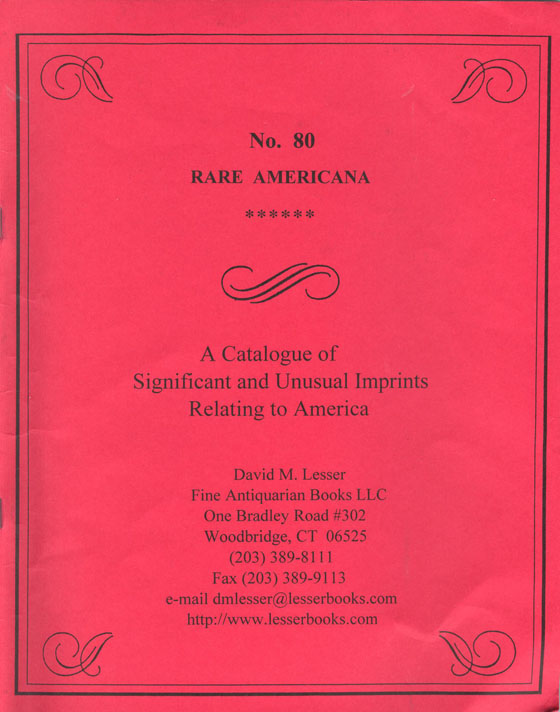Interesting and Unusual Americana from<br>David M. Lesser Antiquarian Books

Interesting and Unusual Americana from<br>David M. Lesser Antiquarian Books
By Michael Stillman
David M. Lesser Fine Antiquarian Books has released a new offering entitled "Rare Americana--A Catalogue of Significant and Unusual Imprints Relating to America (No. 80)". As always, a Lesser catalogue is not only a wonderful source of material for an Americana collection, but also an American history book, filled with glimpses of America in the 18th and 19th centuries.
In 1854, Caleb Barstow made an interesting case against usury laws in his Report Upon the Usury Laws, by the New York Chamber of Commerce. Barstow and the Chamber argue for repeal of New York's usury laws. One suspects that their motivation as businessmen might have been to be able to charge higher interest rates, but he frames his argument in terms of helping the poor person who needs money but can't find someone willing to lend at permissible interest rates. Says Barstow "a very grave mistake is committed whenever the power of the State is exercised to prevent a needy, yet useful and enterprising man from borrowing, merely because he cannot find a party willing to lend for the maximum rate of interest fixed by law." Fortunately, today we have credit card companies to fill this void. Item 16. Priced at $175.
Following the election of 1824, Henry Clay made a momentous decision that would have major consequences on both the direction of his country and his own personal political career. Andrew Jackson had finished the race with a wide plurality but not a majority of the votes. Clay, a distant fourth, would throw his support to John Quincy Adams, allowing the latter to win despite finishing well behind Jackson in the popular vote. Adams would later select Henry Clay as his Secretary of State, a position then considered a major springboard to the presidency. Clay would forever be branded with making a "corrupt deal" with Adams to deny the will of the people in order to advance his own political career.
In 1828, Clay issued the following work whose title says it all: An Address of Henry Clay to the Public, Containing Certain Testimony in Refutation of the Charges Against Him, Made by General Andrew Jackson, Touching the Last Presidential Election. Item 49. $275. If Clay hoped this would salvage the 1828 election for Adams he was mistaken. Jackson swept to an easy victory. Clay himself would be walloped by Jackson in the 1832 election, but would get one more serious chance at the presidency in 1844. Now representing the Whig Party, the "Great Compromiser" would face James Knox Polk, representing Jackson’s Democratic Party. Item 88 is a campaign piece for Polk, written by George Hickman, entitled The Life and Public Services of the Hon. James Knox Polk... In it, Hickman brings up the claim that Clay "defrauded" Jackson, asking "Can Tennessee forget the memorable events of 1824?" While evidently Tennesseans were willing to forgive and forget, as Clay carried the "Volunteer State", the rest of the nation would not, and he lost out on his greatest opportunity to achieve the office he so badly wanted. $250.